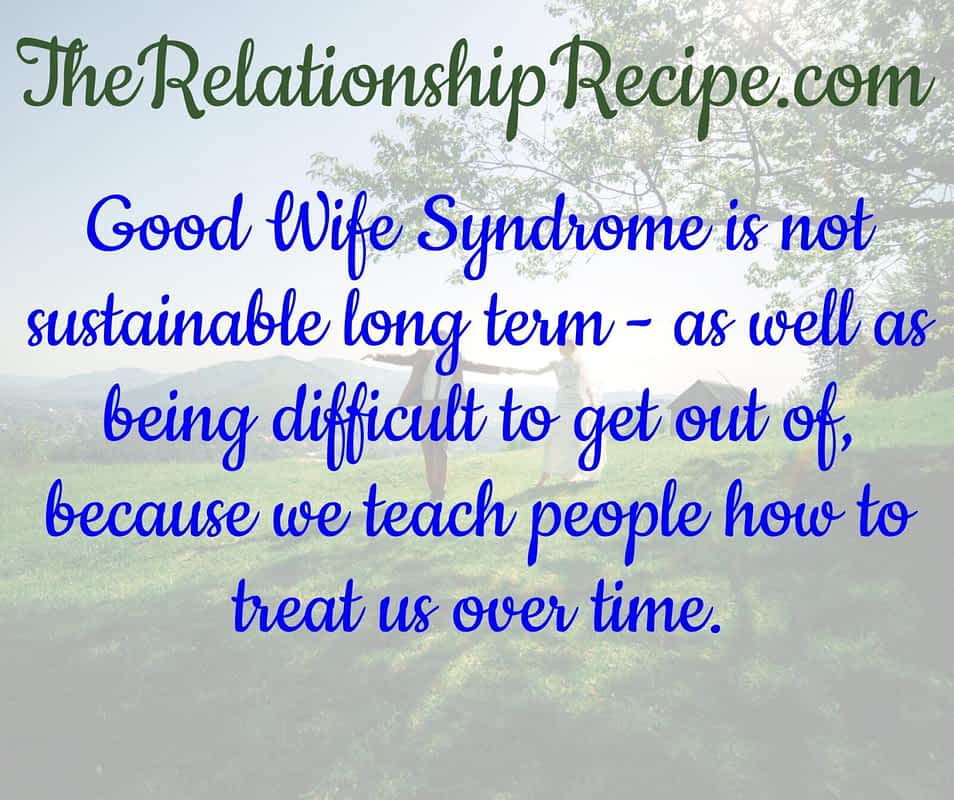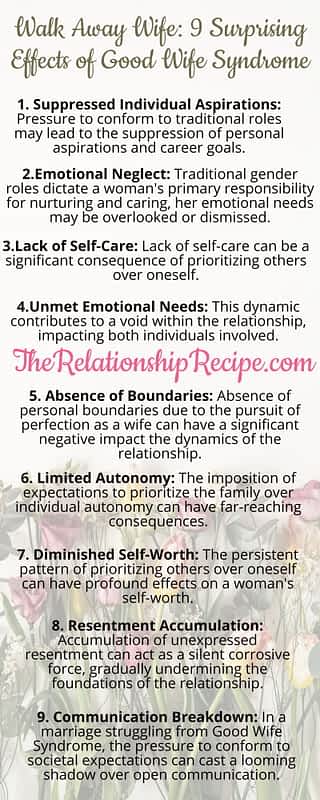Good Wife Syndrome: 9 Hidden Ways it Becomes Walk Away Wife
You know that feeling when you’re doing everything right, and yet, something still feels painfully off? Like you’re checking every box on the “good wife” list, holding it all together with a smile … but deep down, you’re worn out, invisible, and maybe even a little angry. That’s not just marriage burnout. That’s Good Wife Syndrome creeping in.
We’re raised, sometimes subtly, sometimes loud and clear, to believe that being a good wife means putting everyone else first. Keep the house clean. Keep the kids happy. Keep him happy. And for the love of all things, don’t complain. Just be grateful, right? The pressure to be the perfect wife can slowly chip away at your joy, your identity, and your voice.
All that pressure can eventually lead to walkaway wife syndrome. From the outside, it may look like she left out of nowhere, but inside she’s been gone for a long, long time. This is what happens when we bury ourselves under years of unmet needs and unspoken resentment, all because of the pressure to be the perfect wife.
Let’s talk about how these two syndromes are connected, and why so many women are silently unraveling behind their smiles.

What is The Good Wife Syndrome?
The Good Wife Syndrome. You know that quiet, constant pressure to be the perfect wife? The one who smiles even when she’s exhausted, who picks up the slack without a word, who says “it’s fine” when it absolutely isn’t? That’s it. That’s the syndrome.
We’ve been handed this invisible checklist from generations before us to be supportive, never nag, cook dinner, handle the house, keep the peace, don’t forget to look cute, and oh, be endlessly understanding even when you’re running on fumes.
🚀It’s like some twisted reward system where your value is measured by how well you hold it all together for everyone else.
This isn’t just about being kind or loving. It’s about the pressure to be the perfect wife, the one who disappears a little more every year just to keep the marriage running smoothly.
And it’s exhausting.
The pressure to be the perfect wife thrives on the belief that a “good wife” should be selfless, nurturing, and continuously prioritize the well-being of her spouse and family while running herself ragged and putting herself last.
Good Wife Syndrome is not sustainable long term – as well as being difficult to get out of because we teach people how to treat us over time. In my opinion, this is the worst part of it, because untraining people to treat you better is hard when it’s been going on for years.
Once you see it, you can’t unsee it. It upends your whole perspective on yourself, your life, your marriage, and even your relationship with your kids.

What is Walkaway Wife Syndrome?
Walkaway Wife Syndrome isn’t just some dramatic label. It’s what happens when a woman—after years of trying, compromising, giving, and hoping—finally starts to think, “I can’t keep living like this.” It builds slowly. Not overnight, but over years of feeling emotionally neglected, invisible, or like nothing she does is ever enough.
She’s been the peacemaker. The helper. The one who keeps everything going. But inside she’s exhausted, unfulfilled, and deeply lonely. And after all that time pushing her own needs aside to be the “good wife,” she quietly starts imagining what it would feel like to just… walk away. Not because she wants to give up, but because it might be the only way to protect her peace and reclaim her life.
This is what walkaway wife syndrome really looks like – when silence turns into distance, and distance into the decision to finally put herself first.

9 Ways The Good Wife Syndrome Can Lead to Walkaway Wife:
✔️1. The Dreams She Had to Bury
The pressure to be the perfect wife can slowly smother more than just your joy – it can silence your dreams, too. When you’re caught up in pressure to be the perfect wife, it’s easy to downplay your own aspirations.
Maybe you set aside career goals to keep the family running. Maybe you’ve told yourself it’s just “for now.” But over time, that constant self-sacrifice starts to leave a mark.
You stop chasing what lights you up. Your identity gets blurry. You feel stuck, frustrated, and maybe even a little angry, but it’s hard to put your finger on why. Meanwhile, he’s still expecting the same version of you. That disconnect quietly starts eroding the relationship.
Suppressing your goals doesn’t just lead to career stagnation, it chips away at your self-worth. You begin to wonder who you even are outside the role of wife and caregiver. And all that emotional buildup turns into resentment, which only makes the marriage feel more strained, more distant.
That’s the danger of good wife syndrome. It asks you to shrink yourself until there’s almost nothing left, and that’s often what leads women to quietly start imagining their exit.

✔️2. Emotional Neglect
Many of us stuck in good wife syndrome, always putting everyone else first, your own emotional needs start to disappear into the background. You show up for everyone else, but who’s showing up for you?
In marriages on the edge of walkaway wife syndrome, this kind of emotional neglect becomes the quiet breaking point. It’s not just about feeling unappreciated. It’s about feeling invisible. Traditional gender roles tell us we’re supposed to be the caretakers, the emotional glue. But who’s caring for us?
And the cost is high.
You start to feel disconnected. Sad. Anxious. Like no one really sees you anymore. That emotional neglect doesn’t just hurt your heart. It chips away at your mental health, your self-worth, even your physical well-being. As a person with Crohn’s disease, take it from me, chronic stress can make you sick. Tired. Burned out.
To cope, some women check out. This can come in the form of overworking, scrolling endlessly, drinking, or just emotionally shutting down. And if you’ve experienced this kind of neglect before, maybe even growing up, you might start to notice a painful pattern repeating itself.
Over time, it gets harder to trust people. To open up. To believe your voice matters. And without the emotional support we all deserve, even the normal struggles of life can feel 10 times heavier.
This is what happens when the pressure to be the perfect wife goes too far. Meeting everyone else’s needs means there’s nothing left for you.

✔️3. Lack of Self-Care
When you’re caught in the grind of constantly putting everyone else first, it’s easy to put yourself last. Good wife syndrome convinces us that this kind of self-sacrifice is noble. That being exhausted, emotionally drained, and physically rundown is just part of being a “good” wife.
But the truth is, it’s not sustainable. 📉
Without self-care, your body eventually taps out. You’re tired all the time, getting sick more often, running on fumes. Emotionally, you’re spent. Burned out. Snapping over things that never used to bother you. You’re not just tired. You’re empty.
And that takes a toll. On your mental health. On your ability to connect with your partner. On your parenting. On your sense of self. Somewhere along the way, you stop recognizing the woman in the mirror. Not because you’ve changed for the better, but because you disappeared in the process of trying to be everything to everyone.
You lose patience. You lose empathy. You start to resent the people you love, not because you don’t care, but because there’s nothing left to give. And when you speak up, no one listens, or worse, tells you to “just hang in there,” it starts to feel like your pain doesn’t count.
This isn’t just about bubble baths and journaling. This is about reclaiming your identity and refusing to disappear into a version of marriage that only works when you stop existing as your own person.

✔️4. Unmet Emotional Needs
In marriages inching toward walkaway wife syndrome, emotional needs often become collateral damage when feeling the pressure to be the perfect wife. When you’re conditioned to prioritize everyone else, your spouse, your kids, your image, you start to go emotionally hungry. That hunger doesn’t just disappear. It shows up in the quiet erosion of connection.
Over time, this disconnection can lead to deeper emotional distance. The lack of shared vulnerability chips away at intimacy, and conversations go from meaningful to mechanical. Resentment may quietly build as you feel dismissed or undervalued, while the other remains unaware of the emotional black hole forming between you.
With emotions left unspoken or minimized, unresolved tension can surface in the form of conflict or withdrawal. Eventually, your marriage may become vulnerable to outside emotional connections, especially when those needs are met more easily elsewhere. What starts as emotional neglect can end as emotional disconnection, paving the way for walkaway wife syndrome to take root.

✔️5. Absence of Boundaries
When your marriage feels like it’s falling apart and you’re stuck feelling the pressure to be the perfect wife, boundaries usually go right out the window. You stop asking yourself what you need and start doing whatever it takes to hold everything together. You’re constantly stepping up, saying yes, and pushing through, even when you’re running on fumes.
Without boundaries, burnout is guaranteed. You end up stretched way too thin, juggling everyone else’s needs while completely ignoring your own. That kind of pressure builds fast, and before you know it, you’re snapping at people or crying in the shower, not because you’re weak, but because you’re exhausted and no one’s giving back what you keep pouring out.
And it doesn’t stop there. When you’re giving everything to your partner, your kids, your house, your job – or whatever – your friendships start fading, your patience gets shorter, and you stop feeling like you. You’re so focused on “being everything” that you lose touch with your own voice. Communication in your marriage gets weird too, because how can they understand what you’re going through if you never say it out loud?
Then comes the cycle of overcommitment. It always starts small: taking on a little extra here and there. Suddenly you’re the default person for everything, and saying “no” feels like you’re letting everyone down. Guilt piles up anytime you even think about taking a break. And by the time you realize you’re drowning, it’s already become your normal.
You can’t keep showing up for everyone else if you’re disappearing in the process. Boundaries aren’t selfish. They’re survival.

✔️6. Limited Autonomy
When you’re stuck in a marriage where you’re expected to always put your family first, it’s easy to lose track of yourself. Good Wife Syndrome makes it feel like your job is to keep the peace, meet everyone’s needs, and sacrifice your own, even if it’s slowly draining you. But that constant pressure to prioritize everyone else over yourself doesn’t just wear you out, it chips away at your autonomy, your identity, and your happiness.
You stop making decisions that are truly yours. Whether it’s about your job, your hobbies, or even how you spend a Sunday, everything gets filtered through the lens of “What’s best for the family?” And if it doesn’t fit the mold, you push it aside, over and over again. Before long, it feels like your own wants and dreams don’t even count.
That’s not just frustrating, it’s stifling. You don’t grow when you’re constantly stuck in roles someone else decided for you. You end up feeling stagnant, like you’re watching your own life from the sidelines while everyone else gets to play.
That lack of autonomy can quietly breed dependence. When you’re discouraged from making independent choices or stepping outside the “good wife” script, you start second-guessing your ability to stand on your own. It becomes harder to imagine doing things just for yourself, or even knowing what you want without someone else’s input.
That wears down your self-esteem. If your needs and goals are always the last priority, it’s hard not to wonder, Do I even matter? You’re left feeling like your worth is tied to how well you hold it all together for everyone else.
It also messes with your sense of identity. You’re not just a wife or a mom or a partner. You’re a whole person. But when your entire world revolves around what you “should” be doing for others, it’s easy to forget who you are outside those roles.
This lack of freedom can make it hard to even speak up. You might stay quiet to avoid conflict or because you’re scared of being misunderstood, or worse – dismissed. But keeping everything bottled up only builds resentment and makes the emotional distance between you and your partner even wider.
The result is a relationship that feels lopsided. Real connection is hard to build when one person’s voice keeps getting lost in the noise of expectations. And maybe the scariest part is realizing you’re living a life that doesn’t actually feel like yours. You’ve pushed your passions, goals, and even your rest to the back burner for so long, you barely recognize what it feels like to just do something for you.

✔️7. Diminished Self-Worth:
When you’re deep in a marriage shaped by Good Wife Syndrome, always putting others first can slowly chip away at your self-worth. At first, it might feel like you’re just being loving or responsible. But over time, that constant self-sacrifice can turn into something heavier, and way more damaging.
You start feeling like you’re not enough. You might not even realize it at first, but that voice in your head that says your needs can wait or don’t rock the boat starts growing louder. Eventually, it makes you question your own value. You begin to believe your wants and contributions don’t matter as much as everyone else’s.
And because you’re trying so hard to be everything to everyone, pressure to be the perfect wife kicks in. You tell yourself, If I could just do it all better, maybe I’d feel better too. But that feeling never lets up. No matter how much you give, it never feels like it’s enough.
This also makes it harder to speak up. You might struggle to say what you really need or set boundaries, especially if you’re afraid it’ll make things worse. So you stay quiet, keep the peace, and push yourself past your limit. Again.
All of this affects intimacy too. Not just physical, but the emotional connection. When you feel small or unworthy, it’s hard to show up as your full self. You might pull back, afraid your partner won’t see you or love you for who you really are. Or you might overcompensate, hoping love will come back through effort instead of honesty.
To fill that empty cup, you might find yourself chasing approval from your partner, your kids, your boss, social media, whoever. You cling to compliments, little moments of recognition, because deep down, you’re starving for validation because you’ve been overlooked for so long, even by yourself.
Eventually, communication starts breaking down too. You stop bringing things up because what’s the point? You’re afraid your feelings won’t land, or worse, that sharing them will make you feel even more exposed and vulnerable.
This isn’t just a rough patch. It’s what happens when your own sense of worth gets buried under everyone else’s needs. And if this sounds familiar, you’re not alone—and you’re not broken.

✔️8. Resentment Accumulation
In a marriage weighed down by pressure to be the perfect wife, resentment quietly builds up when feelings and frustrations go unspoken. This slow burn starts to eat away at the connection between you and your spouse.
Resentment makes communication break down. When you keep things bottled up, the gap between you widens, and honest conversations become harder to have. That silence can make you feel totally alone, even when you’re in the same room.
As resentful feelings pile on, the emotional bond you once shared begins to fade. The closeness that made the relationship feel safe and warm slowly slips away, replaced by distance and coldness.
Even small disagreements suddenly feel way bigger than they really are. Resentment turns tiny issues into huge triggers, making arguments feel explosive instead of manageable.
Because of all that built-up frustration, conflicts tend to escalate quickly. What might have been a simple misunderstanding before now spirals into something way more intense and draining.
Feeling like the relationship is unfair becomes common. You may start seeing yourself as the one giving way too much, which deepens feelings of hurt and victimization, pushing you closer to the edge of walking away wife syndrome.
That pile of resentment also makes it tough to try fixing things. You might hesitate to open up or seek help because the bitterness makes it feel like nothing will ever change.
When resentment rules the room, problem-solving goes out the window. Instead of working together, you and your partner fall into excuses and blame games or just avoid the real issues altogether.
Over time, all this bottled-up resentment can spark a powerful desire to break free. The weight of it feels unbearable, and walking away starts to look like the only way to find peace again.

✔️9. Communication Breakdown: The Impact on Personal Needs and Desires
When good wife syndrome takes hold, the pressure to fit into those old-school “perfect wife” expectations can shut down honest communication before it even starts.
You might find yourself holding back your true thoughts and feelings, afraid to step outside the role society says you’re supposed to play. That silence isn’t just about avoiding conflict, it’s more like a way of protecting yourself from judgment.
Over time, you start editing who you really are to fit what’s expected. Instead of being open and real, you put on a mask that hides your personal needs and desires. That kind of “acting” decimates any chance for real connection.
It’s not just words you hold back, your feelings get stuck too. You get caught in a loop of unspoken emotions, and suddenly communication feels impossible.
Worrying about how your partner, or even the world, will judge you makes it even harder to speak up. You might feel safer staying quiet than risking being misunderstood or criticized.
All of this adds distance where closeness should be.

Wrapping Up
Good wife syndrome isn’t about love or loyalty, it’s losing yourself in the name of who you think you’re supposed to be. When your emotional needs in marriage are always put last, when you can’t speak freely, set boundaries, or even recognize your own dreams anymore, something’s gotta give.
You don’t have to wait until you’re exhausted, disconnected, or numb. You’re allowed to want more than survival in your relationship.
Start with the basics: speak up, set limits, take up space, and for goodness sakes – fill YOUR cup once in a while. Reclaim your voice before resentment becomes your only language. Because healing doesn’t always start with fixing the marriage. It starts with finally choosing you.

FAQ: Navigating Good Wife Syndrome and Emotional Burnout
1. What is Good Wife Syndrome?
It’s the pressure to be the perfect wife—always selfless, agreeable, and sacrificing—often at the cost of your emotional needs and personal identity.
2. How do I know if I’m dealing with Good Wife Syndrome?
If you constantly people-please, avoid conflict, and feel invisible or burned out, you’re probably stuck in this exhausting dynamic.
3. Can Good Wife Syndrome hurt my marriage?
Yes. It creates imbalance, builds resentment, and slowly erodes emotional connection—especially when your emotional needs in marriage are ignored.
4. What’s a walkaway wife?
She’s the woman who seems to leave “out of nowhere”—but really, she’s been emotionally done for a long time and finally hits her breaking point.
5. Is poor communication a sign of Good Wife Syndrome?
Definitely. When you’re always editing yourself or afraid to speak up, it destroys honest connection and fuels loneliness.
6. Why do I feel guilty prioritizing my needs?
Because you’ve been conditioned to put everyone else first. But meeting your emotional needs in marriage isn’t selfish—it’s survival.
7. What are emotional needs in marriage, anyway?
They’re the basics: feeling heard, valued, supported, safe, and connected. If those aren’t met, love alone won’t fix the cracks.
8. Can setting boundaries help?
Absolutely. Boundaries protect your energy, create mutual respect, and stop resentment from running the show in your marriage.
9. What if my partner doesn’t understand?
Then it’s time for real talk. You can’t fix what you don’t name. Be honest—your needs matter, even if it’s uncomfortable.
10. How do I stop becoming the walkaway wife?
Start choosing you now. Speak up, set limits, and reconnect with who you are outside the wife role—before burnout becomes the end.

This post may contain affiliate links. I earn from qualifying Amazon purchases at no extra cost to you. This content is for informational purposes only and is not a substitute for professional advice. Read full disclaimer.
Thank you for reading this post, don't forget to subscribe!







